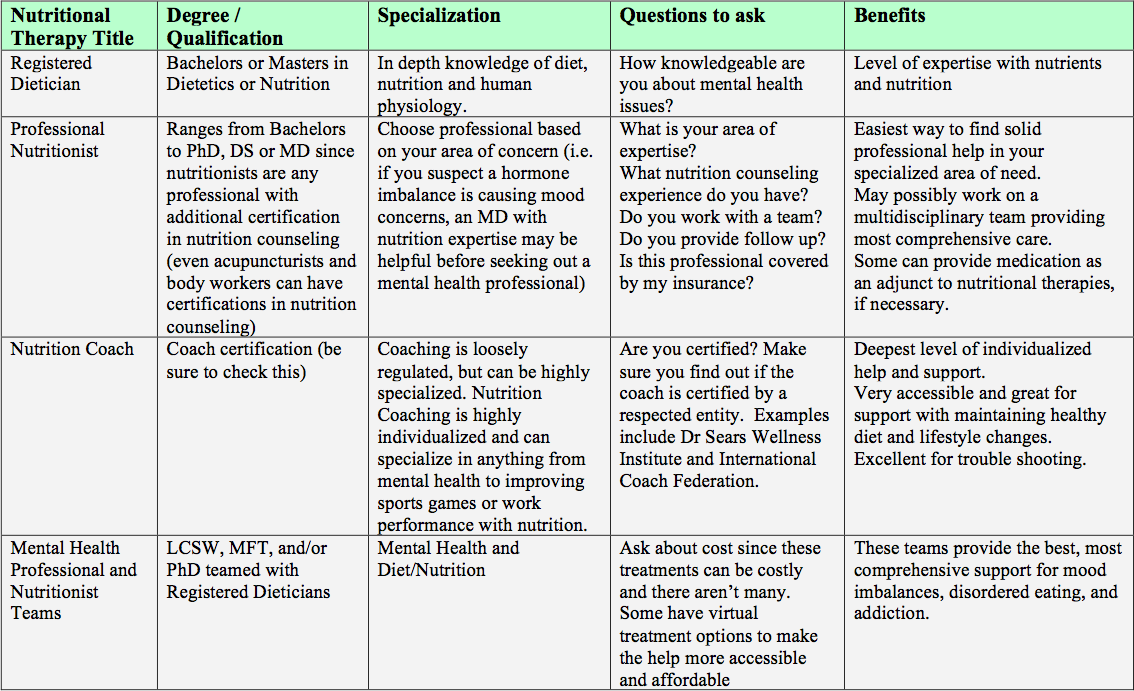What is Nutritional Counseling?
By Laney Cline King, LCSW, LEAN Nutrition Coach
Nutritional counseling is a relatively new area in the mental health care field, aiming to treat imbalances that lead to psychological problems through a therapeutic diet and supplements. It is often offered in the context of general psychological counseling. In the past, nutritional counseling was conducted almost exclusively in institutional health care settings, not in the community clinics and private practice environments where it is currently delivered. Registered dieticians, with a solid background in human physiology and a degree in dietetics or nutrition would advise dietary changes and create meal plans for “patients” to address chronic and other health conditions. However, with mounting research on the impact of food and brain chemistry, nutritional counseling is being used more and more to treat mood imbalances and other mental health conditions, like depression and anxiety.
The belief behind nutritional counseling is that a lack of certain dietary nutrients contributes to certain mental health disorders. Julia Ross, MA, a pioneer in the field of nutritional counseling states, “Problems like overeating, depression, and alcoholism are physical disabilities. Psychological problems are secondary to these caused by imbalances in the brain chemistry that controls our appetite and mood.” While certain conditions may ultimately require medication, nutritional therapies aim to first address chemical imbalances in the brain through changes in diet and supplementation.
The course of treatment with a nutritional therapist usually consists of an in depth assessment of one’s health and mental health, a trial of supplements and individualized whole food meal planning, coaching and counseling to maintain the recommended diet and supplements, adjustments to the plan until physical and emotional symptoms subside, and follow up as necessary.
Nutritional counselors should be distinguished as either “Registered Dieticians,” whose training has been exclusively in the field of dietetics and nutrition, and “Nutritionists,” which refers to any professional that has received credentialing or specialized training to help them advise on issues of nutrition. Nutritionists can include physicians, nurses, chiropractors, mental health professionals, pharmacists and even dentists. Anyone with a Certified Nutrition Specialist title holds an advanced degree and has done peer reviewed research in the field of nutrition, making them an expert in this field. While any of these individuals can advise on nutrition for mental health and chemical imbalances, these titles can be confusing and it is prudent to match your needs with level of education and specialization for your unique issues.
Guide to Nutrition Counseling Title and Credentials:
Scholarly articles that prove the effectiveness of nutritional therapy for mood imbalances, disordered eating and addiction include:
Nutritional therapies for Mental Disorders
Nutritional therapy in practice for learning, behavioural, and mood disorders
Food for the Brain Research database
Psychiatric Nutrition Therapy: A Resource Guide
 About this Contributor: Laney Cline King received her Bachelor of Science in Psychology at the University of California, San Diego and her Masters in Social Work from Columbia University, New York. She is an LCSW (Licensed Clinical Social Worker) with over 10 years of experience helping children and families in a variety of nonprofit settings. As a certified LEAN nutrition coach, she currently provides workshops to families wanting to lead healthier lifestyles. At this time, Laney is most involved with the toughest job of her career, raising her three children in the San Francisco Bay Area. For more information on Laney’s work, visit http://laneyclineking.com/.
About this Contributor: Laney Cline King received her Bachelor of Science in Psychology at the University of California, San Diego and her Masters in Social Work from Columbia University, New York. She is an LCSW (Licensed Clinical Social Worker) with over 10 years of experience helping children and families in a variety of nonprofit settings. As a certified LEAN nutrition coach, she currently provides workshops to families wanting to lead healthier lifestyles. At this time, Laney is most involved with the toughest job of her career, raising her three children in the San Francisco Bay Area. For more information on Laney’s work, visit http://laneyclineking.com/.


Leave a reply
You must be logged in to post a comment.